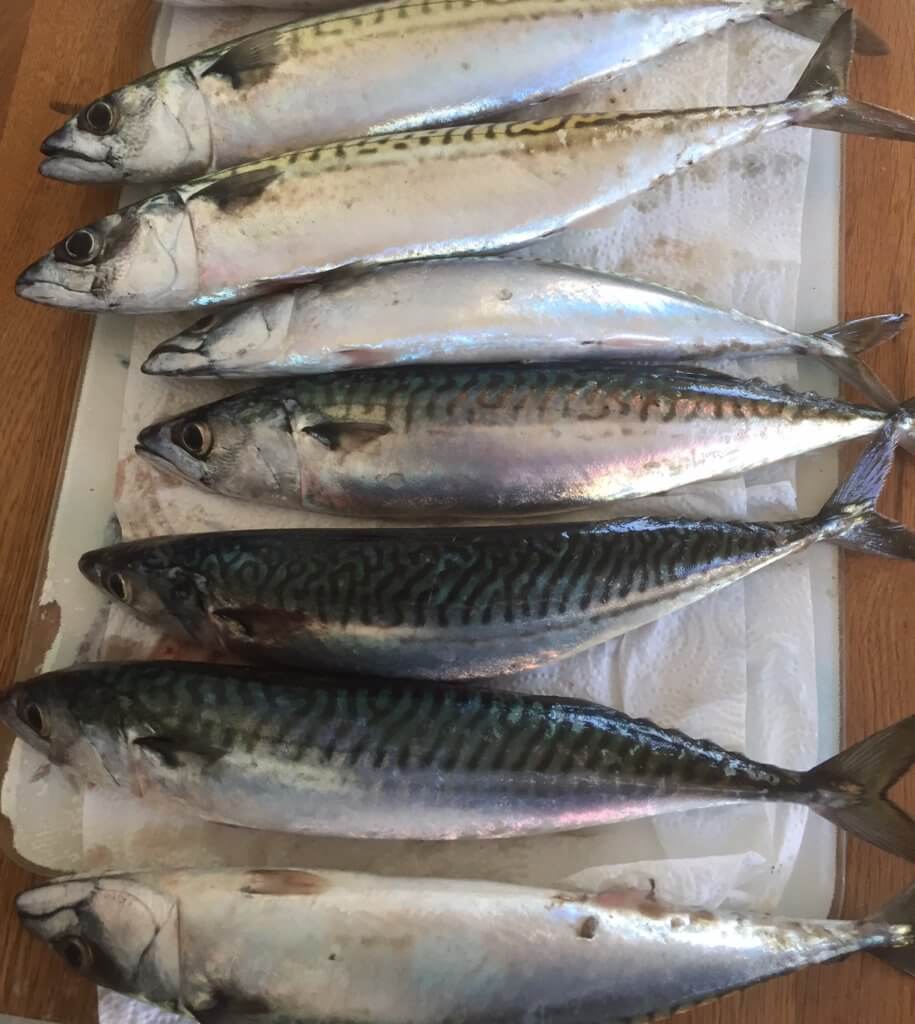
The summer and autumn months bring Mackerel shoals close inshore around much of our coastline. They are like miniature tuna and roam the seas in hungry packs looking for baitfish, snapping voraciously at anything that moves – even a brief pause for reflection would result in the loss of a meal to the other fish nearby. That makes catching them unbelievably easy (if they are there). You don’t even need bait – hooks next to coloured feathers or bits of glinting silver foil work perfectly well.
The only real trick to Mackerel fishing is finding deep water close enough to the shore to cast into. Piers or harbour walls (or boats) are good places though you may have to share the space with other fishermen. Better still are more remote rocky headlands, provided you can find a way down to the water’s edge.
The fish pictured here were caught on a family holiday in north Cornwall, not far from Tintagel, in early September. The scenery was spectacular and to add to the pleasure of fishing we watched a family group of Peregrines trying to catch a Fulmar offshore. I was reminded that my children still call Fulmars ‘Flemers’, something that started several years ago on a trip to Shetland – a combination of mishearing the name and being told these birds could spit a foul-smelling oil at you if you strayed too close to their nests.
You can freeze Mackerel to eat later but this is one fish that tastes far better on the day it’s caught. Barbecuing on the beach is perhaps the perfect way to cook them to ensure the maximum possible freshness and as an excuse to remain outside at the best time of day as the light starts to fade.
To end with a plea. I have never understood why it is normal practice to humanely kill game fish caught in freshwater, and yet it is apparently acceptable to allow sea fish to flap around on the rocks until they die. It’s just one of those strange cultural quirks I suppose, though lacking in any logic that I can see. They should be all be afforded the same respect and killed as quickly as possible.
[registration_form]
I’ve never caught mackerel, although I enjoy eating them. I have in the last 60 years caught trout, grayling and eel to eat, along with rabbits, pheasant wood pigeon and once grey partridge ( a very long time ago, when they were common) I’ also foraged for various fruits, mushrooms and greens. There is something rather special about getting your own food and it somehow tastes better too!
I agree with Ian all should be treated with respect, almost reverence, in this I follow the philosophies of native Americans—-We are all related!
I too have never yet caught a mackerel, but my husband has, and it brought him more joy than you can possibly imagine!!
They are lovely fish. But just catch as many as you need – probably fewer than you think. Unlike almost, if not all other fish, they cannot be returned to the sea and survive once handled by human hands. I don’t know why, but they die sometime later if handled. Of course, you can just shake them off and then they’ll be fine.
Julian, I totally agree. You sometimes see people hauling them in on strings of feathers 3 or 4 at a time. I’m no expert but I’ve read that they are increasingly subject to large-scale commercial fishing so overall they may be under more pressure than in the past.
Just as an example 46000 Tonnes of mackerel were landed in Peterhead in 2015. They are not a threatened species at the moment as far as I am aware. I wonder if the herring can come back to the quantities there used to be, but unless there are large marine conservation zones set up, it is unlikely.
If my maths is right that’s around 100 million fish, assuming they average 1lb each, which is not unreasonable. That doesn’t sound sustainable but maybe it is. If so there must be lots of them out there.
I love catching Mackerel and then eating them. A few years ago I was introduced to the the fact that the best way to cook mackerel is not to. They taste delicious raw – cut up shashimi style with some soy, wasabi and lemon juice. Food of the gods!
Also, often I catch pollock when trying to catch mackerel, pollock, are in my opinion, an underrated eating fish, especially when fresh that day. I don’t recommend raw pollock though!!
I might just give that a go – possibly. I tend to use a single spinner when Mackerel fishing, partly because I don’t usually want to catch them 3 or more at a time but also because it makes catching other species, including Pollack, much more likely.